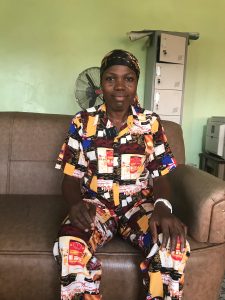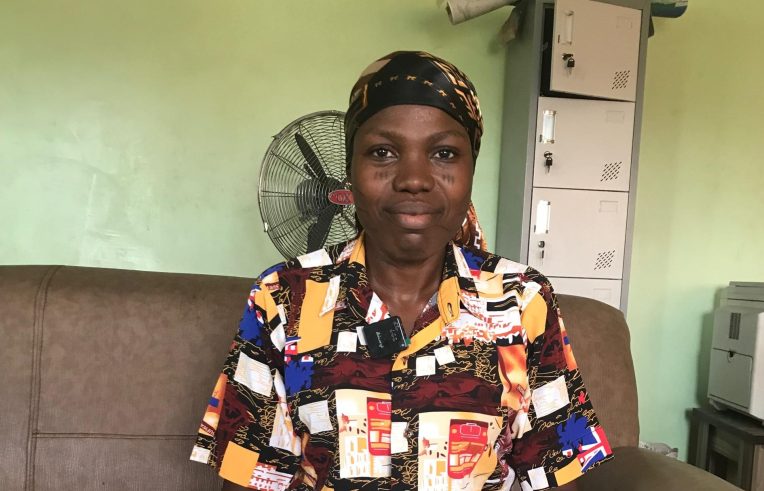Watchmen or as we rightly call them, Health Champions, are critical for community-based health surveillance to succeed. They support with prevention practices that reduce the spread of infectious diseases and also participate in the detection, reporting, and management of suspected cases. Considering that community health is critical for national health security, our Strengthening Community Knowledge and Response on Infectious Disease Prevention (SCKaR-IDP) project is a commitment to developing more Health Champions who can prevent diseases and save lives.
Kehinde Omolade, a Traditional Birth Attendant and Local herb seller at Alayabiagba ward in Ajeromi-Ifelodun local government area of Lagos state, is one of those voices from the field who shared an inspiring story of how she saved a life through patience and observation, based on the learnings from actively engaging with DRASA.
In her words, “Patience is the chief of all virtues, if you are trying to educate people, you have to exhibit patience, and good character and not get angry easily.”
How confident do you feel now about teaching others how to prevent the spread of diseases?
I have full confidence to tell them. For example, I tell my neighbors not to keep their potties uncovered at their doorstep and to dispose of it properly. I also encourage them to always wash their hands and clean their environment. Even when I am walking on the road and I see a food seller opening their food without covering it, I ask them to cover it because I too can be hungry and buy from it. Some of them will even fry puff puff and akara and open it. I always make sure to correct them. Before, when I saw something that was not good I would keep quiet and say it does not concern me, but now, when I see anything that is not good I always talk. In fact, some people even complain that I always say what I see and I have accepted it that way.
Can you share a specific example of something you did in your community to spread the word about staying healthy after you became a Health Champion?
Since I became a Health Champion I have helped a lot of people. Before I couldn’t leave my job to help anybody, but now I sometimes volunteer myself and follow people to the hospital to help them get care. There was an incident that happened when a neighbor of mine who was infected with tuberculosis refused to go to the hospital. He said that it was a spiritual attack and that nothing was wrong with him. After speaking to him severally and he refused, I called some people I know at Tolu Primary Health Centre, informed them about it, and described the house of the person to them. When the ambulance got to the house, the mother denied that there was any such case, it was not until after much persistence that they later told the truth. So they went in and picked him up to take care of him at the hospital. When this happened my neighbor was really angry, saying I had done him bad and he was threatening to deal with me when he came back. But after he returned and was well, he greeted me and thanked me and even gave me 1,000 Naira to show his appreciation. He said that he thought I was doing him bad but now that he is fine, he sees that I did it in his best interest.
What changes have you noticed around you since you started sharing what you learned?
I have seen a lot of changes now. My environment used to be a very dirty one before now and when you try to advise them [neighbors] they are always stubborn, but now they understand that cholera kills people, clean their gutters regularly, clean the toilets, and even check their septic tanks for fear of the government coming to close the compound. Even the children in the compound now wash their hands more regularly. I have seen a lot of positive changes.
What challenges have you faced while trying to use what you learned in the community and how did you handle these challenges that made reception easier?
Ah, I have faced a lot of challenges. Many of them leave their children’s potties open in the corridor and sometimes flies perch on them and those same flies on food too. People have called me different names, some have even called me agbepo [potty carrier], but how I handle it is through patience. There is an adage that says that patience is the chief of all virtues, and if you are trying to educate people, you have to exhibit patience and good character and not get angry easily. I always help them understand that what is good for myself is also good for them so that none of us die prematurely due to unhealthy actions.
In the future, what role would you like to play in keeping your community safe and what would you like to see differently in your community when it comes to staying healthy?
I would like to continue educating others and see that people around me have good health and people are not dying prematurely due to lack of good health. Even for myself, I have to continue to take precautions to keep myself healthy, and If I see something I must say something. I would continue educating my neighbors, hoping that soon, the government will intervene so we can have a long-lasting impact.

Beyond enlightening communities about identifying, reporting, and protecting themselves from infectious diseases, the Strengthening Community Knowledge and Response on Infectious Disease Prevention (SCKaR-IDP) project has helped build a closer-knit relationship between members of Somolu and Ajeromi-Ifelodun Local Government Areas of Lagos state who are now their brother’s keepers, ensuring that they are safe and healthy.
Watch this video to see how it went.




